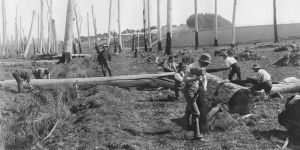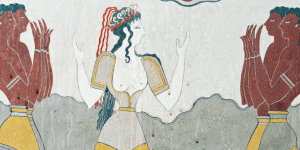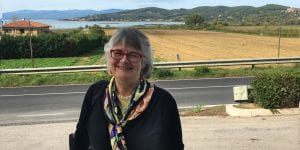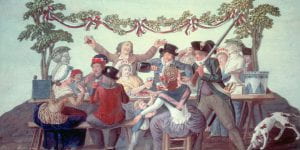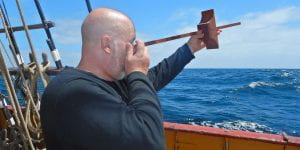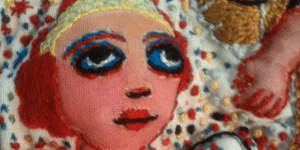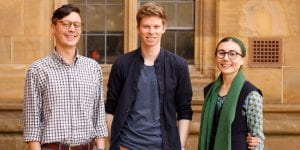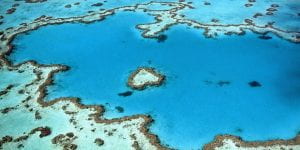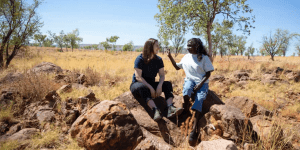Category: News
-
A German Solution to an Australian Problem? 1890s Unemployment and the Leongatha Labour Colony
After Volkhard Wehner was awarded a PhD in 2017 for his thesis on the history of Victoria’s German-speaking community (1850–1930) he soon realised that after completing that milestone, life does not suddenly end. Rather, it opens up countless new possibilities. After reflecting on the transition from the pressures and intensity of the PhD experience, he […] -
How Do You Crack the Code to a Lost Ancient Script?
The decipherment of Linear B, the earliest form of Greek, was a history changing achievement, but decoding the older Linear A would open a new window on the origins of European culture. In one of our posts on Forum earlier in 2019, we interviewed SHAPS lecturer Brent Davis, who in this article reposted from University […]blogs.unimelb.edu.au/shaps-research/2019/11/07/how-do-you-crack-the-code-to-a-lost-ancient-script
-
Tracing the Evolution of Cancer Cytogenetics: An Interview with PhD candidate Lynda Campbell
After retiring from a distinguished scientific career, Lynda Campbell developed an interest in the history of her field. -
Living the French Revolution: A Symposium in Honour of Peter McPhee
The most significant event in French revolutionary studies ever to be held in Australia took place on 9 and 10 July 2019 at the University of Melbourne. Fourteen distinguished international scholars, along with their Australian counterparts, contributed to a symposium in honour of the great historian of France, Emeritus Professor Peter McPhee AM. Their presence […] -
Researching History on the High Seas
Last year, History of Science lecturer Dr Gerhard Wiesenfeldt sailed across the South Atlantic on a tall ship. During the six-week voyage, he explored the use of early navigational instruments including the cross-staff and astrolabe. In the following interview, Gerhard describes this unique experience to Samara Greenwood. Could you give us a brief overview of […]blogs.unimelb.edu.au/shaps-research/2019/10/18/researching-history-on-the-high-seas
-
The Woman Who Stitched Her Way into Art History
Known for her bold and bright work, artist Mirka Mora was a trailblazer for women artists in the 1970s, bringing ‘feminine techniques’ to the forefront of art. Grimwade Centre Honorary Fellow Sabine Cotte discusses Mirka’s life, work, and legacy in this article, originally published in the University of Melbourne’s Pursuit. Mirka Mora was one of […]blogs.unimelb.edu.au/shaps-research/2019/10/14/the-woman-who-stitched-her-way-into-art-history
-
Hansen Trust PhD Scholarship in History
From 2015, the extraordinary Hansen Gift — the largest ever made to a History program in Australia — has transformed the teaching of History at the University of Melbourne. One strand of the initiatives funded by the Gift is an annual Hansen Trust PhD Scholarship in History. Applications for next year’s round are currently open, […]blogs.unimelb.edu.au/shaps-research/2019/10/09/hansen-trust-phd-scholarship-in-history
-
Real Problem, Wrong Solution: Why The Nationals Shouldn’t Politicise the Science Replication Crisis
Last week, politicians and farming lobbyists weighed in on the replication crisis in science and a number of academics, including several from SHAPS, responded in the following article republished from The Conversation. The National Party, Queensland farming lobby group AgForce, and MP Bob Katter have banded together to propose an ‘independent science quality assurance agency’. […] -
On Studying Chinese History in Melbourne: An Interview with Dr Xavier Ma
In 2017 Xavier Ma became the first postgraduate from the People’s Republic of China to receive a PhD in History from the University of Melbourne. Xavier came to Melbourne in 2013 on a scholarship targeting graduates of Peking University. During his candidature, he distinguished himself by winning a D. Kim Foundation Fellowship to support him in the […] -
Conserving Australia’s Cultural Record
At the Grimwade Centre for Cultural Materials Conservation, Western disciplines like chemistry, physics, art history and archaeology help us to analyse, understand, preserve and restore Australia’s cultural heritage. It’s part of a history of conservation that stretches back centuries; emerging from the Western intellectual tradition of universities, museums, libraries, archives and galleries throughout the eighteenth […]blogs.unimelb.edu.au/shaps-research/2019/09/26/conserving-australias-cultural-record
Number of posts found: 365
